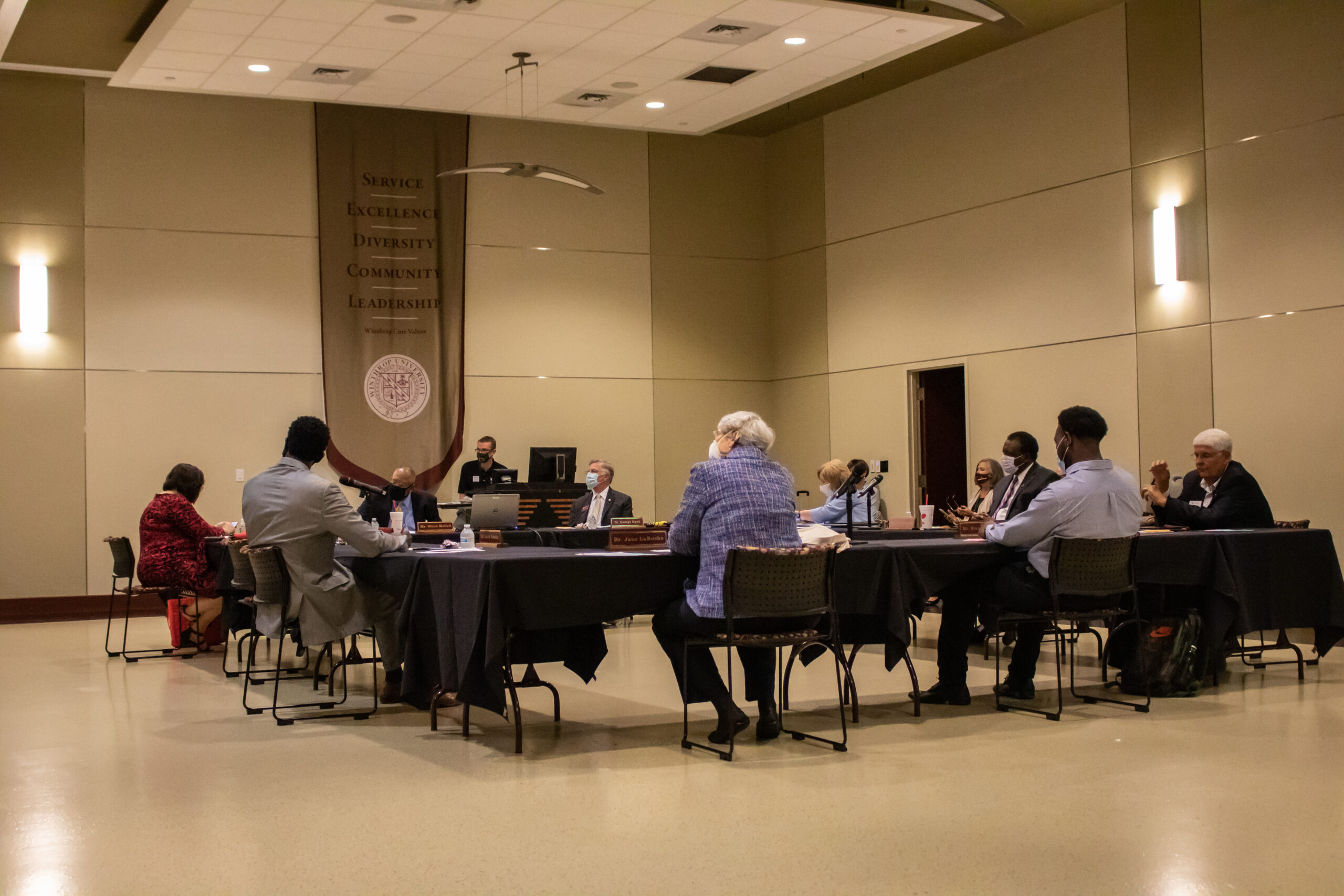Winthrop University professors in the College of Arts and Sciences brought forth concerns in a recent faculty assembly regarding appearances and addresses by conservative political figures at a recent board meeting.
At the meeting, six conservative speakers, including U.S. Rep. Ralph Norman and S.C. state Sen. Wes Climer, were each allotted 10 minutes to present their opinions on subjects such as free speech and the elimination of tenure in defense of Winthrop’s former Dean of Dacus Library Mark Herring and his controversial “The Wuhan Wilding” opinion piece. The column was published and shortly thereafter retracted by the Against the Grain library science journal due to strong disapproval by readers for its perceived racist and xenophobic remarks, including statements referring to COVID-19 as the “Kung-Flu” and the “Wuhan Virus.”
The partisan group collectively criticized Provost and Vice President of Academic Affairs Adrienne McCormick for removing the piece from Winthrop’s Digital Commons and publicly condemning Herring’s statements through an email.
“For [Mccormick] to take down the writings of the professor because she disagreed with it, that violates the First Amendment and the board needed to know that,” Norman said to the board at the meeting. Norman went on to say that colleges should be held accountable for violating the Constitution and subsequently supported the elimination of tenure that would protect faculty that infringe upon others’ rights to freedom of speech.
Climer addressed his concerns to the board following Norman’s remarks. He claimed that McCormick had censored and censured, or officially criticized, Herring’s work.
“This is how you treat children, not scholars,” Climer said to the board of trustees. “This institution matters to me and it matters to this community. And when I see it falling into disrepair, as is clearly the case with the mistreatment of Dr. Herring, I feel an obligation to speak up, not to condemn, but to encourage you, as the governing body of this institution, to hold the highest values of the institution.”
After listening to the six speakers’ remarks, the board approved a resolution reaffirming Winthrop’s “commitment to the First Amendment right of free speech and expression and to document our mission.”
Some faculty feel that the board was not as transparent with the public as they should’ve been prior to the resolution’s approval.
“[The faculty] were sent notice by the secretary of the board notice that the board would be meeting and considering a resolution,” Scott Huffmon, a professor of political science, said in an interview. “More than 24 hours before the board meeting, I emailed the secretary and asked her if I could see a copy of the resolution so that we might have an idea of what was going to be talked about at this meeting. My email was ignored, and nobody found out about the resolution until after it was voted on. Only the following day did she send me a copy of the resolution. Since it was a Word document I was able to look at the day it was created, and it was created the day I asked for a copy.”
“I don’t think there’s any reason the resolution could not have been sent out prior to the meeting,” Huffmon said. “Clearly there were people and politicians notified about what was going to be discussed at the meeting, and the rest of the public was kind of in the dark.”
At a later board meeting, Huffmon was given the opportunity to respond to the accusations levied against Winthrop and McCormick by the Republican group.
“Every speaker at the previous meeting was told they could have 10 minutes to address the board,” Huffmon said. “I was only given three minutes to address them. You can draw your own conclusion about whose opinion is more valued.”
The small faculty group’s collected grievances were anonymously presented by a CAS representative at a CAS assembly meeting. Members of the CAS faculty group drew similarities between the conservative speeches given by the politicians and
recent controversies surrounding the influence of politics on the University of South Carolina’s Board of Trustees, which has earned the school’s governing board heavy criticism by publications like The Chronicle of Higher Education.
“I think the board is probably amenable to the idea that faculty adore this institution, and we would like to have input on its governance since we have tied our entire lives to this university, the same way students have. Students will always be Winthrop Eagles no matter what, but members of the board will come and go. I think greater transparency would send a message to faculty members and students that they are valued,” Huffmon said.
Photo by Olivia Esselman.




